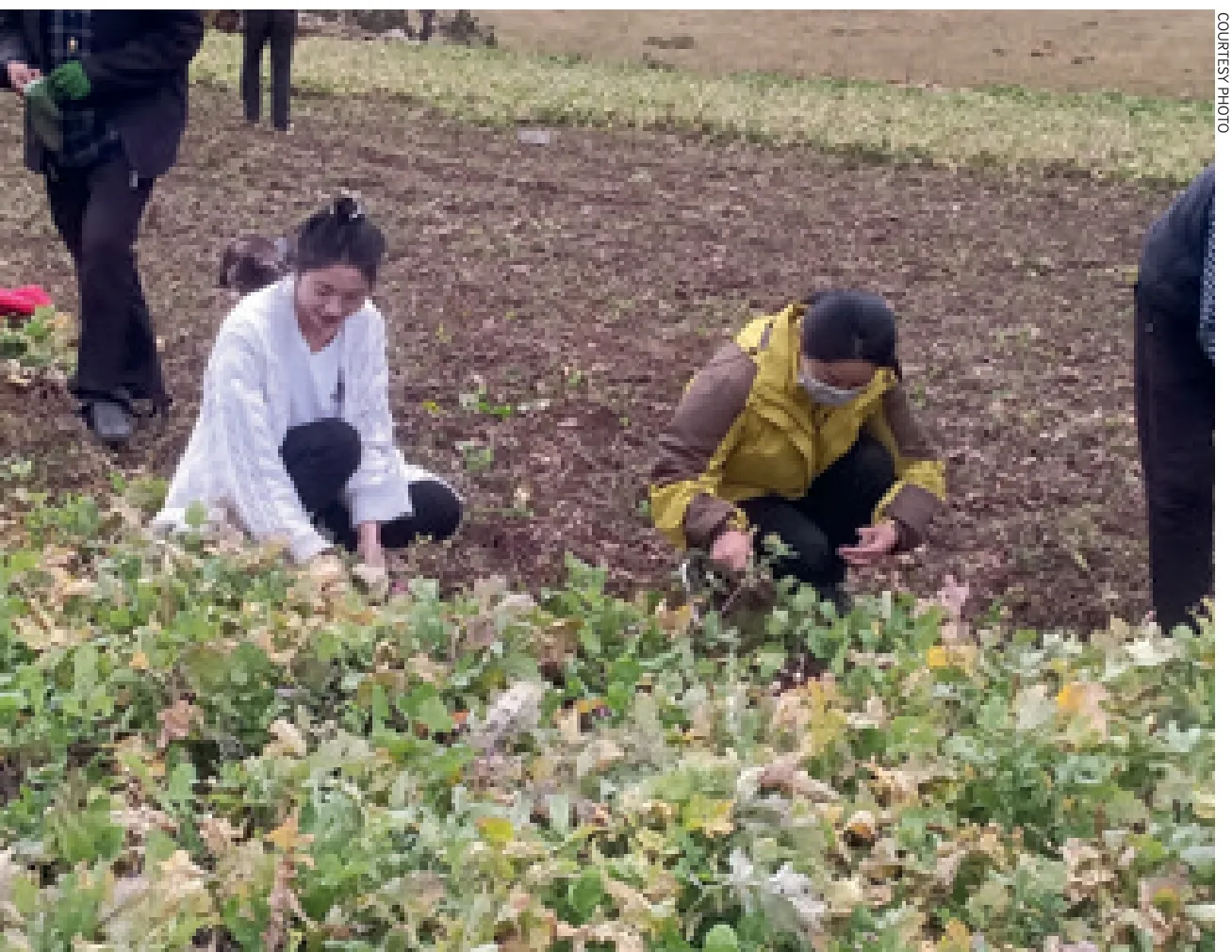Rooting for Rural Residents
2022-11-09OneyoungTibetanwomancommitmenttohelpingremotevillagegrowByTaoXing
One young Tibetan woman’s commitment to helping a remote village grow By Tao Xing
‘Who would want to buy yak fodder?”This was the burning question among local farmers when Kelsang Chodron first proposed to develop the Tibetan turnip industry in 2019—the year she was assigned to Xamkyim Village in Tibet Autonomous Region to help its 591 residents prosper.
The Tibetan turnip is an edible and medical plant with effects of tonic and anti-hypoxia, heatclearing and detoxification, and alleviating fatigue according to traditional Tibetan medical books. The plant is cultivated in Tibet’s pastoral farming areas and has long been considered a hardy and cheap vegetable—with freshly harvested ones selling for 2 yuan ($0.28) per kg.
Through the efforts of Kelsang Chodron,Xamkyim’s total revenue from turnip cultivation reached 120,000 yuan ($16,469) in 2021, adding a little to local income.
“The figure isn’t a high one right now, but we will continue to purchase more raw materials from locals to expand production in the coming years,”30-year-old Kelsang Chodron, leader of a working team stationed in the village, under the jurisdiction of Riwoqe County, Qamdo City, toldBeijing Review.
As part of its poverty alleviation program, since 2013 China has been dispatching working teams to underdeveloped villages in the country’s substantial rural areas to help every household in need.Team members usually come from government organizations, state-owned enterprises and public institutions. This system has continued after China eradicated absolute poverty in late 2020 and embarked on its pursuit of rural revitalization.
Zero to one
Xamkyim shook off absolute poverty in 2017,Kelsang Chodron said, adding caterpillar fungus,valued for its medicinal properties, and beef were major sources of income, albeit with limited output.
“We need more ‘cash cows’,” Kelsang Chodron said. The development of new economic projects could really help the village progress and give locals the opportunity to increase their income, without having to rely too much on assistance from the outside.
After realizing the village could perfectly accommodate the large-scale and high-quality planting of the Tibetan turnip, Kelsang Chodron managed to persuade more locals to start planting the root vegetable by convincing them of its large profit potential. For example, dried turnip can be sold for up to 100 yuan($14.06) per kg. Depending on the quality, 2 to 3.5 kg of fresh turnip can produce 1 kg of dried turnip.
Moreover, a group of villagers took the initiative to set up a cooperative,which dries the turnips and then sells them at the county seat. Referred to as farming cooperatives, these groupings typically consist of members from one or more villages. The venture is jointly managed by its members who then share the profits. In other words, the cooperative provides villages and farmers with an entrepreneurial platform for commercial production.

Kelsang Chodron (in white) and locals harvest Tibetan turnips at Xamkyim Village of Riwoqe County, Qamdo City in Tibet Autonomous Region, on September 27, 2021
This particular cooperative acquires high-quality raw turnips from locals,with the buying price usually higher than the going market price, according to Kelsang Chodron.
In 2020, the village received 700,000 yuan ($95,817) in funding from government agencies and used that to build a 400-square-meter factory, which can now produce over 1,500 kg of dried turnip a year.
The cooperative not only championed efforts to improve the wellbeing of the villagers, e.g., by launching several public service programs, but also provided locals with new job opportunities and eased farmers’ concerns of not being able to make a profit from their raw produce. “At the end of the line, the cooperative’s profits are divided among all villagers,” Kelsang Chodron explained.
One to more
Communist Party of China (CPC) members shall serve the public interest and work together with the people around them to solve problems, Kelsang Chodron said. This in fact reflects the most valued of Party standards, and she for one practices what she preaches.
To further develop their burgeoning turnip business, she and her colleagues conducted more than 20 surveys to hear and gather local voices—and gain more support. Just a young woman, at the very onset of the ambitious undertaking,Kelsang Chodron went the extra mile by traveling to the county seat and back to sell products—a round-way trip covering 90 km.
With the gradual increase of production, Kelsang Chodron takes a handson approach when it comes to the different marketing channels. In addition to selling to customers in the county seat and neighboring cities with the help of relevant agencies, she promotes the product nationwide through the convenience of social media and e-commerce platforms.

Members of a farming cooperative hold a meeting to decide on profit distribution in Xamkyim Village of Riwoqe County, Tibet Autonomous Region, on December 25, 2021
Along with China’s thriving social media scene, its commercialization has been gaining ground, with a nonstop influx of novelties reshaping the retail landscape. Vendors use social platforms to approach potential consumers,make sure their brand message hits home and cut communication costs. Summing up, social media has reshaped e-commerce.
Decked out in full traditional Tibetan dress,Kelsang Chodron usually acts as the live-streaming host and promotes the goods on social media.On her personal WeChat Moments, similar to a Facebook timeline or Twitter feed, she often shares more information about the Tibetan turnip to boost sales.
“WeChat and Douyin [the Chinese version of TikTok], two of China’s most popular superapps and almost daily essentials, have become major channels for us to communicate with consumers,”she added. A large part of their products are now sold through e-commerce.
When Kelsang Chodron first came to the village in 2019, she was there on a one-year assignment.Before that, she had worked as a police officer in her hometown in Riwoqe following her graduation from a police academy in Tibet’s regional capital of Lhasa in 2014.
“An industry cannot be developed within one year and the villagers wanted me to stay,” Kelsang Chodron said, adding she chose to continue her mission after completing the one-year term.
“I am not sure when I will wrap up my work here and return to my usual job. Right now, they need me here and I will stay put. I believe that is the right thing to do,” Kelsang Chodron elaborated.As a Party member, she is all too aware of the need to go beyond oneself for the greater good.
Kelsang Chodron submitted her application for Party membership in 2016 and joined the CPC in 2018. “I will try my best to live up to the Party’s original aspiration and founding mission of seeking happiness for the Chinese people, including ethnic minority groups,” she said.
Kelsang Chodron has a rooting interest in China’s campaign to give the nation’s rural areas a complete makeover and will do whatever it takes to contribute her share. BR
